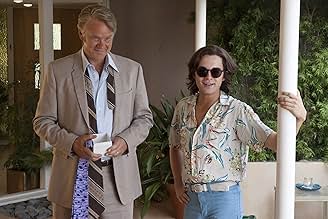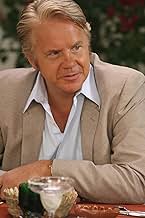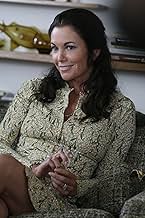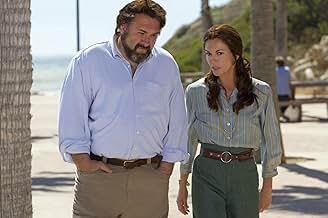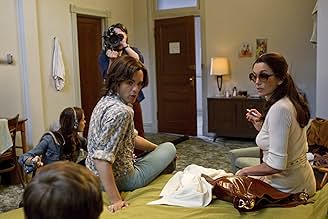CALIFICACIÓN DE IMDb
6.5/10
4.1 k
TU CALIFICACIÓN
Agrega una trama en tu idiomaA behind-the-scenes look at the making of the first American family to be the subjects of a reality TV show.A behind-the-scenes look at the making of the first American family to be the subjects of a reality TV show.A behind-the-scenes look at the making of the first American family to be the subjects of a reality TV show.
- Dirección
- Guionista
- Elenco
- Ganó 1 premio Primetime Emmy
- 7 premios ganados y 34 nominaciones en total
- Dirección
- Guionista
- Todo el elenco y el equipo
- Producción, taquilla y más en IMDbPro
Opiniones destacadas
This film speaks volumes about the ethical dilemmas doc-makers (and "reality TV" producers) all-too-frequently face. Some choose to do the ethical thing and tell an unvarnished truth, most are happy to sell their soul for ratings. Strong filmmaking from the folks who brought us American Splendor and have now once again cut to the heart of the American Dream. If you watch "reality TV" and believe it, this is mandatory viewing. Diane Lane will break your heart, Tim Robbins shatters deeply held delusions about the Playboy/Esquire lifestyle and James Gandofini's strong performance is a scream in the dark urging us to dump the junk TV and watch more substantial fare. This is great American filmmaking.
In 1971 an all American family from Santa Barbara in California were chosen, seemingly at random, to take part in a TV experiment. It was to become the world's first reality TV show called "An American Family" and its stars, the Loud family – both by name and at times by nature, were to become national phenomena.
But to get to legendary status the show's producer, Craig Gilbert, had a pretty hard sell to the board of TV company PBS who were reluctant, to say the least, to commit to the show and began to baulk at the cost of production as the film stock costs (in particular) began to mount.
Their concern was about the "view-ability" of the show and whether it would find an audience. They needn't have worried because what gradually emerged was a tale of a swinging misogynist father (Tim Robbins), a hopeless and helpless (but sultry in Gilbert's opinion) Mom played brilliantly by Diane Lane and a screamingly gay son, Lance, played gleefully by Thomas Dekker. Not to mention a looky-likey Rolling Stones band fronted by the other two boys.
But it's what's going on in the mind of Producer Gilbert (played masterfully by James Gandolfini with a very unlikely full beard and absolutely no gangster element whatsoever to draw on) that is the meat of the movie. Well, I say a movie but it's actually a documentary set within a drama, about a reality TV documentary that turns out larger than life than any drama.
At points we see side by side comparisons between the "real" family and the 2011 actors. It's uncanny. Gandolfini manipulates all sides as he makes the "action" more and more interesting but in doing so contributes to the family meltdown and the confidence of his crew. It's terrific.
I don't think this ever made it to cinema, it's an HBO production, but it's great and I saw it last night on Sky Atlantic so is likely to be repeated at some time. If it is tune in because it's a little gem.
But to get to legendary status the show's producer, Craig Gilbert, had a pretty hard sell to the board of TV company PBS who were reluctant, to say the least, to commit to the show and began to baulk at the cost of production as the film stock costs (in particular) began to mount.
Their concern was about the "view-ability" of the show and whether it would find an audience. They needn't have worried because what gradually emerged was a tale of a swinging misogynist father (Tim Robbins), a hopeless and helpless (but sultry in Gilbert's opinion) Mom played brilliantly by Diane Lane and a screamingly gay son, Lance, played gleefully by Thomas Dekker. Not to mention a looky-likey Rolling Stones band fronted by the other two boys.
But it's what's going on in the mind of Producer Gilbert (played masterfully by James Gandolfini with a very unlikely full beard and absolutely no gangster element whatsoever to draw on) that is the meat of the movie. Well, I say a movie but it's actually a documentary set within a drama, about a reality TV documentary that turns out larger than life than any drama.
At points we see side by side comparisons between the "real" family and the 2011 actors. It's uncanny. Gandolfini manipulates all sides as he makes the "action" more and more interesting but in doing so contributes to the family meltdown and the confidence of his crew. It's terrific.
I don't think this ever made it to cinema, it's an HBO production, but it's great and I saw it last night on Sky Atlantic so is likely to be repeated at some time. If it is tune in because it's a little gem.
Minor, though still entertaining cable-made docudrama from directors Shari Springer Berman and Robert Pulcini chronicling the would-be Sturm und Drang that went on behind-the-scenes of PBS's "American Family", an 11-hour television series in 1971 which presented the lives of The Louds, a "typical" family from Santa Barbara, CA. The Louds, who have since cemented their legacy as the first reality-TV family, brought in big ratings for the so-called "education network". Ordinary people, they were picked out of a society column by an ambitious producer and were followed around by a small camera-crew for some 78 days; still, high drama was hard to come by (patriarch Bill Loud had the wandering eye; eldest son Lance Loud was a flamboyant singer who had already moved to New York City when production began; while spouse Pat Loud, strong and confident, was the glue who kept kids and husband together). There wasn't much happening behind--nor in front of!--the lens, except for some mild flirting between Pat and the crafty, cunning producer, and Pat's discovery that her husband had been carrying on affairs with a number of different women. The editors of the actual show had a tough time piecing together enough watchable product, while this rendering of events, penned by the estimable David Seltzer, suffers the same fate. The groovy production-design is spot-on, and Diane Lane has several strong moments portraying Pat...yet this American family simply wasn't cliffhanger material. It all seems much ado about nothing.
"Cinema Verite" may be a new art form: a drama shot in semi-documentary style about a documentary series (shot in 1971, televised nationally in 1973) which itself hovered between the spontaneous and the rehearsed. This 90-minute effort takes about a third of its running time time to get off the ground, but when it does it becomes fascinating as both sociology and drama.
At first it seems as if there is no point in re-enacting the back story to the famous series that followed the ups and downs of the upper-middle-class Loud family of Santa Barbara. Nothing particularly interesting happens as a producer (James Gandolfini) talks a married couple (Diane Lane and Tim Robbins) into allowing cameras into their lives for an unprecedentedly close look at the perfect American family. The real drama begins only when the participants are forced to grapple with the big choices (what and what not to film, what and what not to do when the camera is rolling, how to handle the fact that their lives have decisively changed once the cameras entered). The actors here give themselves totally to this multi-leveled process and come out with flying colors.
We see the actual Loud family in snippets from the original series juxtaposed with their contemporary impersonators who seamlessly fill their shoes, sometimes in mid- conversation. The casting is very good; the resemblances are striking. (But as close a match as Diane Lane is to Pat Loud, Demi Moore would have been even closer.) Some clever member of the creative team even decided to frame the whole enterprise with Mama Cass's 1969 song hit "Dream a Little Dream of Me" (originally a hit in 1931, about 40 years before "An American Family"'s time), allowing the song to surface again, 40 more years down the road, as underscoring to an examination of "the first reality show." A neat touch.
One thing they got wrong was the performance of the underground play "Vain Victory" which the mother attends in the company of her gay son, Lance. The performers and venue for such ragtag productions were a lot funkier than depicted in this otherwise spot-on production. Of course, by 2011 cultural standards such drag acts are as tame and commonplace as Twinkies, but they were enough to drive Pat Loud out of the room back in '71.
At first it seems as if there is no point in re-enacting the back story to the famous series that followed the ups and downs of the upper-middle-class Loud family of Santa Barbara. Nothing particularly interesting happens as a producer (James Gandolfini) talks a married couple (Diane Lane and Tim Robbins) into allowing cameras into their lives for an unprecedentedly close look at the perfect American family. The real drama begins only when the participants are forced to grapple with the big choices (what and what not to film, what and what not to do when the camera is rolling, how to handle the fact that their lives have decisively changed once the cameras entered). The actors here give themselves totally to this multi-leveled process and come out with flying colors.
We see the actual Loud family in snippets from the original series juxtaposed with their contemporary impersonators who seamlessly fill their shoes, sometimes in mid- conversation. The casting is very good; the resemblances are striking. (But as close a match as Diane Lane is to Pat Loud, Demi Moore would have been even closer.) Some clever member of the creative team even decided to frame the whole enterprise with Mama Cass's 1969 song hit "Dream a Little Dream of Me" (originally a hit in 1931, about 40 years before "An American Family"'s time), allowing the song to surface again, 40 more years down the road, as underscoring to an examination of "the first reality show." A neat touch.
One thing they got wrong was the performance of the underground play "Vain Victory" which the mother attends in the company of her gay son, Lance. The performers and venue for such ragtag productions were a lot funkier than depicted in this otherwise spot-on production. Of course, by 2011 cultural standards such drag acts are as tame and commonplace as Twinkies, but they were enough to drive Pat Loud out of the room back in '71.
These reality show movies are hard to watch. I did not hear about the Louds before. But it would have been interesting to watch what went wrong with America's sweetheart family. However, the script did not have enough punch to hold the interest for the entire time. James Gandolfini is such a good actor. He made an unlikeable character tolerable. Diane Lane was not quite believable as a gullible, wronged woman. Tim Robbins was watchable, however something was missing and I just didn't believe in his character. It started out fine, had a lot of potential when it moved to Manhattan, but somewhere down the second act, it lost its grip. Wish it had the momentum going somehow. Alas, it didn't end too well for me.
¿Sabías que…?
- TriviaIn the scene where Lance Loud is on the phone with his family, he reads a media description of himself and his "flamboyant, leech-like homosexuality". That's a direct quote from an article written for The New York Times by Anne Roiphe. She made equally scathing remarks about the entire Loud family.
- ErroresThe Louds' Mercedes has a California plate with the number style 1AAA000. These plates did not appear until 1980.
- ConexionesFeatured in The Tonight Show with Jay Leno: Episode #19.129 (2011)
- Bandas sonorasDream A Little Dream
Written by Fabian Andre, Gus Kahn & Wilbur Schwandt
Performed by Cass Elliot (as Mama Cass)
Courtesy of Geffen Records under license from Universal Music Enterprises
Selecciones populares
Inicia sesión para calificar y agrega a la lista de videos para obtener recomendaciones personalizadas
Detalles
- Fecha de lanzamiento
- País de origen
- Idioma
- También se conoce como
- Rạp chiếu phim Verite
- Productoras
- Ver más créditos de la compañía en IMDbPro
- Tiempo de ejecución
- 1h 26min(86 min)
- Color
- Mezcla de sonido
- Relación de aspecto
- 1.78 : 1
Contribuir a esta página
Sugiere una edición o agrega el contenido que falta


